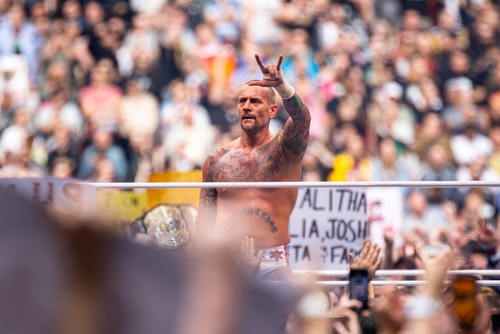I have a confession to make: To the embarrassment of my family, especially my wife, I continue to watch professional wrestling. I’m a sucker when an entire arena is directing “heat” (negative reactions like booing) at a “heel” (the “bad guy”). And when the “babyface” (the “good guy”) is about to do his finishing move off the top rope, I’m not sure there’s a more exciting moment in sports or entertainment.
Over the Labor Day weekend, I bought tickets for a pay-per-view event in Chicago with a new(er) wrestling promotion called All Elite Wrestling (AEW). While not sharing the popularity of the WWE (yet), AEW has surged to the number two professional wrestling company in the world and has weekly shows on TBS and TNT. I was most looking forward to seeing a wrestler by the name of CM Punk, a former WWE champion. Punk is from Chicago, and civic pride dictates that you support him, even when he plays the role of a “heel.”
Though rumored to headline the pay-per-view, Punk didn’t appear. The day before the Chicago show, his contract was terminated for cause due to a real backstage fight with another wrestler, Jack Perry (son of Luke). Despite the suspension of disbelief necessary to truly appreciate professional wrestling, this wasn’t a “work” (a made-up angle). It also wasn’t Punk’s first altercation; indeed, almost a year to the day, he broke “kayfabe” (presenting wrestling as real and unscripted) and instigated a brawl with other wrestlers, which resulted in a several-month suspension.
The president of AEW, Tony Khan, to the dismay of my fellow Chicago “marks” (fans who behave as if wrestling isn’t staged), issued a statement, saying, “The incident was regrettable and it endangered people backstage. That includes the production staff, the people who help put the show on every week – innocent people who had nothing to do with it.” Continuing, he stated, “I’ve been going to wrestling shows for over 30 years. I’ve been producing them on this network for nearly four years. Never in all that time have I ever felt until last Sunday that my security, my safety, my life, was in danger at a wrestling show.” And the “finisher” (a wrestler’s signature move): “I don’t think anybody should feel that way at work. I don’t think the people I work with should feel that way.”
Interestingly, Khan didn’t terminate Perry’s contract, even though video showed that Perry’s “promo” (an in-character interview or monologue) immediately before the fight with Punk likely led the two to tussle. Perry is indefinitely suspended, but as far as we know, he still works at AEW.
Putting aside Khan’s statement, which was clearly written by lawyers seeking to provide evidence of “cause” due to the inevitable, forthcoming breach-of-contract lawsuit, one wonders whether AEW had a workplace violence policy. If one existed, you would think that Khan (or his lawyers) would have referenced Punk’s violation of it.
The OSHA Angle: Requirements and Recommendations
The Occupational Safety and Health Administration (OSHA) has reported that “acts of violence and other injuries is currently the third-leading cause of fatal occupational injuries in the United States.” While there are no federal laws establishing a duty to prevent workplace violence, all employers have a general duty to provide a safe working environment, and OSHA can issue citations to employers for violations of this general duty clause: 29 U.S.C. 654(a)(1). OSHA requires employers to implement a workplace violence prevention program if they experienced acts of workplace violence or become aware of threats, intimidation, or other potential indicators that show the potential for violence in the workplace exists or has the potential to exist. In the past several years, OSHA has issued citations to employers for failing to address employees’ risk of being attacked by mentally ill clients, for not providing training to staff on how to respond to a threat or physical assault, for not having adequate measures to protect staff from physical assault, and for having ineffective workplace violence programs.
OSHA recommends that all employers institute several management steps, including allocating resources to prevent violence, developing a system of accountability, and creating a zero-tolerance policy for workplace violence.
Employers, Pin Down Your Zero-Tolerance Policies!
While a missive like “don’t beat up your coworker” may seem obvious, even in an industry like professional wrestling, in which beating up your coworker is the company’s mission, the large damages AEW faces for breach of contract could have been avoided with a zero-tolerance policy that was consistently enforced. With a zero-tolerance policy, both Punk’s and Perry’s contracts would have been terminated for cause. Punk wouldn’t be able to make arguments that AEW lacked consistency under the policy because his contract was terminated and Perry’s wasn’t. Indeed, Punk’s contract may have been terminated for cause in 2022, and the incident a few weeks ago when Khan feared for his “security, [his] safety, [his] life” never would have happened.
This should serve as a reminder that all employers should implement zero-tolerance workplace violence policies and provide such training to their managers, supervisors, employees, and contractors. Whether it’s a hospital whose job it is to save lives or a professional wrestling company whose job it is to put people in hospitals, when enforced consistently, these policies can significantly reduce liability for employers.
Rob Entin is a partner at FordHarrison. He has been practicing traditional labor and employment law for over 24 years, and utilizes his experience as a former in-house counsel for a Chicago-area labor union to advise clients in complex labor relations issues, including the defense of unfair labor practice charges, representation at arbitrations, counseling prior to and during union organizing drives, and negotiation of collective bargaining agreements. Not limited to traditional labor, Rob also represents and counsels clients in various employment litigation matters, obtaining favorable results in federal and state courts and administrative agencies. Rob can be reached by email at rentin@fordharrison.com.
The post <strong>EntertainHR: Don’t Be Punk’d Without a Workplace Violence Policy</strong> appeared first on HR Daily Advisor.
